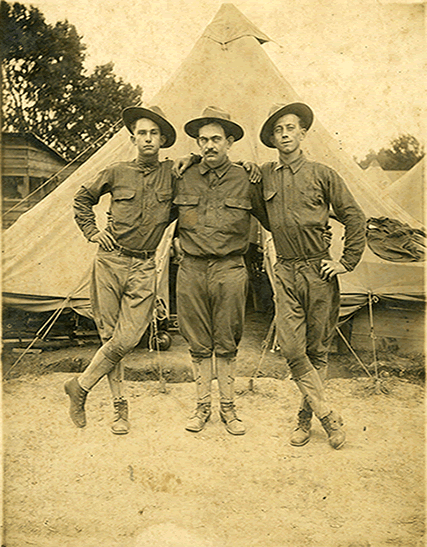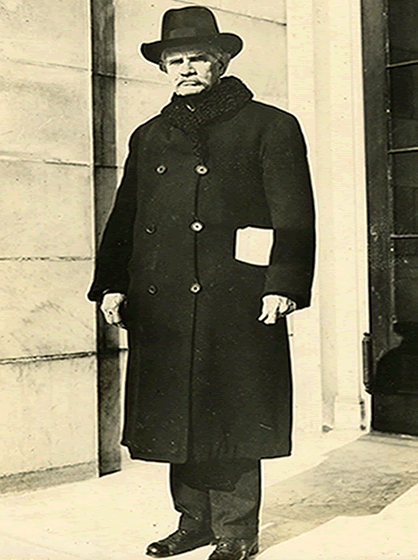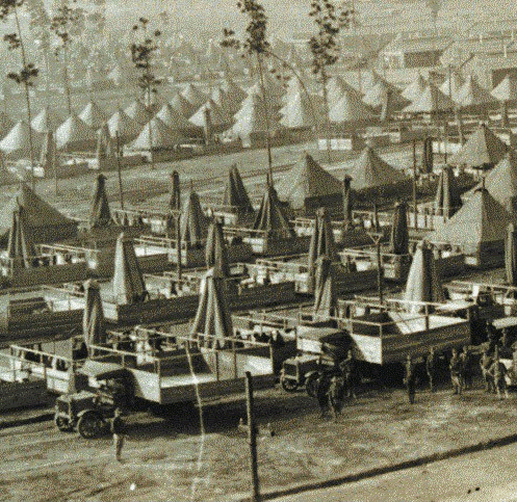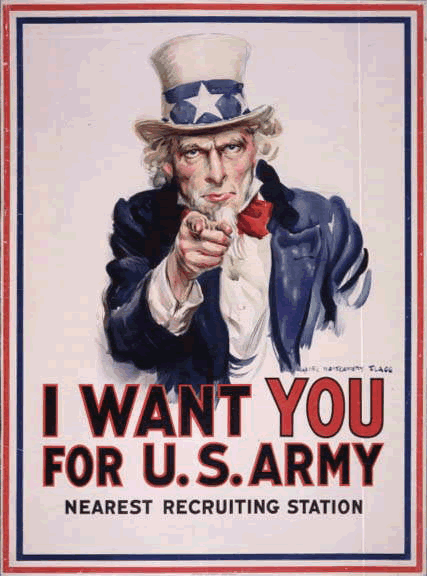The president of the United States addressed the nation and called for war. Tyrants, he said, could not be allowed to destroy the bonds of civilization by engaging in inhumane and immoral actions that oppressed their own people and threatened their neighbors. The world had to be made safe for democracy.
The nation's leading newspapers overwhelmingly agreed with the president, but the American people were divided. While some enthusiastically backed the official call to arms, critics suggested that the war was being undertaken to further privileged economic interests.
No, this was not President George W. Bush seeking military action against Iraq in 2003; rather, it was Woodrow Wilson in 1917 mobilizing the United States for war against Germany.
President Wilson's April 2, 1917, war message to Congress identified the major reasons he believed the United States had to enter the conflict which had ravaged Europe since August 1914. The principal provocation was Germany's adoption of unrestricted submarine warfare against the Allies (primarily Britain, France, Italy, and Russia), which violated the neutral rights of the United States to engage in peaceful commerce with warring nations. By March 1917, German submarines had already sunk several American ships and Wilson denounced this new method of warfare as inhumane. Wilson also railed against the authoritarian regime in Germany, contrasting it unfavorably with the democratic governments of the Allied powers. The Zimmermann Telegram, an inept German attempt to form a military alliance with Mexico against the United States, further suggested German hostility. Thus, in Wilson's view, the United States had no choice but to go to war to defend its rights and those of free peoples everywhere.
The state of Mississippi was not immune from the great debate over war and peace. Indeed, Mississippi's two U.S. senators took diametrically opposed positions. The senior senator, John Sharp Williams, fully supported President Wilson's call to arms. James Kimble Vardaman, however, not only voted against the declaration of war, but he resisted the administration's call for selective conscription and went on to oppose other measures that the Wilson administration deemed essential for the war effort. An examination of the views of Williams and Vardaman, and of their respective constituents, suggests that Mississippians were far from unified behind Wilson's war.
Williams and Vardaman
The respective stances of senators Williams and Vardaman can be explained, in part, by the fact that each represented distinct interests and factions within the Mississippi Democratic Party of the early 20th century. Williams was an archetypal Bourbon Democrat, primarily representing the planter and business class of the state who considered themselves the natural leaders of society. The Bourbons were social and political conservatives who supported the interests of White landowners and generally favored low taxes and minimal state spending. They took a paternalistic attitude toward Black citizens, whom they considered to be inherently inferior and dependent on White guidance.
Vardaman, meanwhile, represented the agrarian wing of the party. Heirs to the Populist tradition of the 1890s, the agrarians were willing to use state power to further the interests of poorer White citizens, mostly small farmers. Vardaman supported such progressive reforms as a graduated income tax, restrictions on child labor, woman suffrage, and antitrust measures to break up the concentrated economic power of the giant corporations. Vardaman's populism, however, was strictly for White citizens only. He was an inveterate racist. He frequently deployed extremist rhetoric about Black citizens to garner the votes of poor White citizens against his Bourbon opponents.
Debating war
Williams's response to President Wilson's call for a declaration of war, like that of many upper-income southerners, drew upon the Lost Cause mythology of the American Civil War. On the floor of the Senate, he insisted that American manhood and honor required the United States to fight to defend its interests against the continuing German transgressions of neutral rights. He suggested that opponents of the war were guilty of treason and declared that it was better to die with honor than live as a coward. While too old himself to fight, Williams later expressed pride in the fact that three of his four sons volunteered for military service. Across Mississippi, the overwhelming majority of newspapers backed the president and praised Williams's leadership. Even former President Theodore Roosevelt wrote to express his support of the senator's efforts.
Meanwhile, Williams's junior colleague and bitter political rival cast one of only six Senate votes against the declaration of war. Rather than glorifying the Lost Cause, Vardaman and his predominantly White rural constituents recalled the horrors of the Civil War, characterizing it as a “rich man's war and a poor man's fight” in which the latter had suffered the heaviest losses. Vardaman suggested that, once again, the United States was being drawn into war by privileged economic interests, such as bankers and munitions makers. He argued that most ordinary Americans had no desire to join the European conflagration, and suggested that “the great toiling masses of America” who would pay the heaviest price in lives and treasure ought to have a voice in any decision for war. While recognizing that he held a minority view, he argued that his conscience required him to oppose the declaration of war. His words were of no avail. The Senate voted for war on April 4, 1917.
The draft
The political divide between Williams and Vardaman, and their respective interests, spilled over into the question of conscription, or the draft. Immediately following the declaration of war, the Wilson administration requested legislation to draft up to 1.7 million men for the duration of the war. Williams agreed that only compulsory military service for the duration would enable the United States to mobilize its manpower rapidly and efficiently, and avoid the persistent problem Civil War armies had faced with short-term enlistees leaving in mid-campaign. Compulsory service, moreover, was democratic in that it would ensure that all social classes carried their fair share of the military burden.
Again, Vardaman saw things differently. Anticipating that military service would fall most heavily on the backs of the rural and urban poor, he threw his support behind efforts to amend the administration's bill to require that the War Department seek an all-volunteer army first, and only resort to conscription if enlistments proved to be inadequate.
The question of race also figured in the discussion of the draft. Vardaman warned that drafting Black men would result in “arrogant strutting representatives of the black soldiery in every community,” which could jeopardize the whole structure of White supremacy. Williams and other conscription supporters retorted that drafting Black soldiers in proportion to their presence in the general population was the only way to ensure that they would perform military service at all. Equally important, conscription would actually safeguard White supremacy by maintaining the existing racial balance in the South by removing both Black and White young men from the community proportionately. Vardaman's objections notwithstanding, Congress overwhelmingly approved the administration's bill.
As the Selective Service System went into effect, Vardaman's fears for poor rural White people were confirmed. The government's regulations classified agricultural workers as expendable, and even married rural workers with families sometimes found it difficult to obtain exemptions from the county draft boards dominated by members of the local White establishment. The board members often assumed that the $30 per month that soldiers received exceeded the typical income of most southern White people and thus was more than adequate compensation for the absence of a male breadwinner. Meanwhile, wealthy southern White people, their sons, and sometimes even their Black workers, received deferments. In all, 157,607 Mississippians eventually registered for the draft, 75,977 White registrants and 81,548 Black registrants, and by the end of the war, some 19,296 White troops and 24,066 Black troops had been inducted into the military.
The draft situation was impacted by the Houston (Texas) riot of August 1917. There, several dozen regular United States Army Black troops from 3rd Battalion, 24th Infantry, had responded to repeated provocations by White law enforcement officials in Houston by arming themselves and heading into town. In the bloodshed that followed, four policemen, four soldiers, and eleven civilians were killed and the army eventually court-martialed and executed nineteen soldiers for mutiny.
Following this incident, southern governors pressured the War Department to remove Black troops from their states, and the following month the Wilson administration temporarily suspended the call-up of Black draftees. The states, however, still had to meet existing troop quotas. To make up for the shortfall of Black inductees, and to avoid stripping predominantly Black counties of all eligible White males, Mississippi sent larger numbers of White draftees from counties with a low percentage of Black residents, typically the counties most heavily populated by small White farmers. Not only were Black draftees from Mississippi inducted into the military later than their White counterparts, but they were also assigned to noncombatant functions. Thus, as Vardaman had predicted, the burden of fighting fell most heavily on poor, rural White Mississippians.
Resistance
Wartime legislation, such as the Espionage Act of 1917 and the Sedition Act of 1918, greatly limited the ability of opponents of the war to speak out openly, but many ordinary Mississippians found other ways to resist the war effort. One tactic was to refuse to buy war bonds. In Neshoba County, for example, the staunchly pro-war newspaper condemned “foolish talk” by unnamed locals who had apparently been urging people not to buy liberty bonds. More tangibly, almost eight thousand Mississippians deserted by either not showing up for induction into the military or by going absent without leave. The state's 12 percent desertion rate was comparable to such states as Massachusetts and California. Even Governor Theodore G. Bilbo, Vardaman's protégé, was suspected by some federal officials of foot-dragging in filling the state's draft quota.
Occasionally, overt armed resistance developed. In the spring of 1918, army troops were sent into Neshoba, Lauderdale, and Tippah counties to round up armed bands of deserters in the countryside who were hiding out and receiving support from family members and friends. Most of the deserters surrendered peacefully, but an exchange of gunfire resulted in two deaths in Tippah County. Significantly, the county went for Vardaman in the 1918 Democratic Senate primary.
1918 election
Ultimately, Vardaman paid a political price for his outspoken defiance of the Wilson administration on such issues as the declaration of war, the draft, and the Sedition Act. Congressman Pat Harrison challenged Vardaman in the 1918 Democratic Senate primary with the backing of John Sharp Williams. Harrison's supporters continually pounded on the theme of Vardaman's disloyalty to President Wilson and the nation. Scurrilous rumors surfaced that Vardaman was in the pay of the German Kaiser and had bought a plantation near Greenwood with German money. Harrison's theme became: “All Vardaman men are not disloyal, but every disloyal man is for Vardaman.” Even President Wilson entered the fray by publicly endorsing the efforts to unseat Vardaman. Not surprisingly, Harrison eventually defeated Vardaman by more than 11,000 votes.
On closer inspection, however, the 1918 Senate primary vote lends credence to the notion that many Mississippians remained unreconciled to the war. Despite the hostility of most Mississippi newspapers, official repression and intimidation of his supporters, and the intervention by the president of the United States, Vardaman carried twenty-four mostly northeastern counties. The election results suggest that, as federal officials had feared, a significant portion of public opinion in Mississippi was still opposed to the war.
Richard V. Damms, Ph.D., is a professor of history at Mississippi State University.
Lesson Plan
-

Men with Company L, 1st Mississippi Infantry, organized in Clay County, Mississippi, in 1916. Henry Hardy of West Point is in center; other two men are unidentified. Courtesy Mississippi Department of Archives and History, Jack Elliott Photograph Collection, PI/1989.0013. -

Senator John Sharp Williams, who supported the war, stands in front of the Senate Office Building in Washington, D.C., circa 1920. Courtesy Mississippi Department of Archives and History , PI/POL/1981.0078.
-

U.S. Senator James K. Vardaman opposed the war and cast one of only six Senate votes against the declaration of war. Courtesy Mississippi Department of Archives and History. -

Construction of troop quarters at Camp Shelby near Hattiesburg, Mississippi, in 1917. Note the pre-fabricated hut structures on the trucks. Camp Shelby opened July 1917. Courtesy Mississippi Armed Forces Museum, Camp Shelby. -

James Montgomery Flagg's famous 1917 recruiting poster was produced by the Division of Pictorial Publicity of the Committee on Public Information during World War I. Courtesy Library of Congress Prints and Photographs Division, LC-USZC4-594.
Oral histories
Hear 83-year-old WW1 veteran Thomas L. Richardson talk about the Battle of Metz. The Smith County native graduated Mississippi College in 1917, joined the Marines, and went to France. Audio clip from April 1978 Tom Healy interview courtesy The Center for Oral History and Cultural Heritage at the University of Southern University.
Lauderdale County native and WW1 veteran Henry Eason remembers his time in France during 1918. Read excerpts from his October 1972 interview with Dr. Orley Caudill. Courtesy The Center for Oral History and Cultural Heritage at the University of Southern University. (PDF)
Sources
Breen, William J. Uncle Sam at Home: Civilian Mobilization, Wartime Federalism, and the Council of National Defense, 1917-1919. Westport, CT: Greenwood Press, 1984.
Chambers II, John Whiteclay. To Raise an Army: The Draft Comes to Modern America. New York: Free Press, 1987.
Congressional Record , 55. 2 April 1917 and 4 April 1917.
Fortenberry, Joseph E. “James Kimble Vardaman and American Foreign Policy, 1913-1919.” Journal of Mississippi History , 35, 1973. 138-39.
Holmes, William F. The Great White Chief: James Kimble Vardaman. Baton Rouge: Louisiana State University Press, 1970.
Keith, Jeanette. Rich Man's War, Poor Man's Fight: Race, Class, and Power in the Rural South during the First World War. Chapel Hill: University of North Carolina Press, 2004.
Neshoba ( Mississippi ) Democrat, 25 April 1918.
Osborne, George Coleman. John Sharp Williams: Planter-Statesman of the Deep South. Gloucester, MA: Peter Smith, 1964.
Second Report of the Provost Marshal General to the Secretary of War, on the Operations of the Selective Service System to December 20, 1918. Washington, D.C.: U.S. Government Printing Office, 1919.
